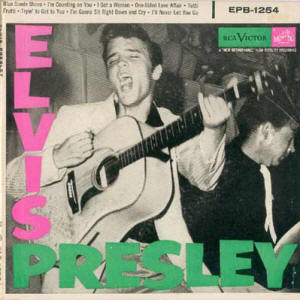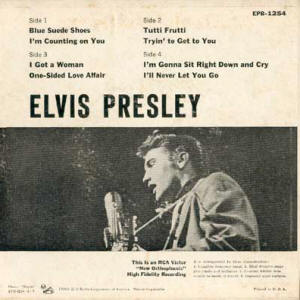

Simultaneously with the long player "Elvis
Presley" RCA Victor also released an extended
player and a double extended player of the same
name. In contrast to the single ep this set
didn't chart, but RCA Victor still sold several
100,000 copies.
The ep is not available on the streaming
platforms since all tracks can be found on the
album "Elvis Presley" (1956). In 2016 the
complete Presley catalogue was restored and
remastered by Vic Anesini for a boxed set of 60
compact discs called "The Album Collection".
Sony Music Entertainment provides the streaming
platforms with the same versions of the
individual albums (in some cases with bonus
tracks), albeit in 24 bit/90 khz flac. That
means, if the platform of your choice supports
high resolution audio, you can enjoy the tracks
in the same quality Sony used to scan and master
them.
The label must have puzzled the fans
somewhat, because with "Elvis Presley" (the
album), "Elvis Presley" (the ep) and "Elvis
Presley" (the double-ep) there were three
releases of the same name and with the same
artwork. At least the back covers were designed
differently, here a photo made at one of Elvis'
appearances on "The Stage Show" was used.
Blue Suede Shoes
The song is based on an occurrence Johnny Cash
had witnessed while on military service in
Landsberg Am Lech/Germany. His supervisor always
used to say "don't step on my blue suede shoes"
when he wanted to point out one should not
challenge him. Cash told the story to Carl
Perkins and when he saw a dancing couple with
the man keeping the lady at distance to avoid
she was stepping on his shoes, he mixed the
incidents and turned them into a song. He called
the result "Blue Suede Shoes" and released it on
January 1, 1956 on a single. Because Elvis liked
the song and had performed it on television
Steve Sholes pressed him to record it in the
studio. The young singer gave in and put the
song on tape on January 30, 1956 within ten
takes. Sholes planned to release the song on a
single and use the market power of RCA Victor to
entice the hit away from Carl. It is said that
Elvis opposed and the track was used on the
album only. However, in August 1956 "Blue Suede
Shoes" was issued on a single with "Tutti
Frutti", another cover version of a recent hit.
Elvis re-recorded "Blue Suede Shoes" in 1960 for
the movie "G.I. Blues", but this time in a much
tamer arrangement. Live versions can be found on
"From Memphis To Vegas / From Vegas To Memphis"
(1969) and "Aloha From Hawaii Via Satellite"
(1973). Another recording, this time made in
1968 for the tv special "SINGER presents Elvis",
was featured on "A Legendary Performer - Volume
2" (1976). It's safe to say that Elvis never
even came close to his great original recording.
I'm Counting On You
The ballad was penned by Don Robertson and
recorded by Elvis on January 11, 1956 at the RCA
Studio in Nashville/Tennessee. The slow song
costed him some effort, he needed 17 takes
before he archived a satisfactory result. In general I
like this song, but I am sure that Elvis would
have performed it better an later years.
I Got A WomanIn early 1955
Ray Charles had stormed the R&B-Charts with a
song called "I've Got A Woman" and a very young
Elvis had included it in his live show almost
immediately. The song was based on the gospel
"It Must Be Jesus" and was written by Renald
Richard and Ray Charles. The Hillbilly Cat
recorded it on January 10, 1956 at the RCA
Studio in Nashville/Tennessee and needed eight
takes to do so. Elvis himself
obviously loved the song because he kept it in
his live show until the very end. It's also
featured on "Elvis Recorded Live On Stage In
Memphis" (1974) and "Elvis In Concert" (1977).
One-Sided Love AffairOn
January 30, 1956 Elvis recorded "One-Sided Love
Affair" within eight takes. The song was written
by Bill Campbell. Today
it's overlooked by fans
and critics, but I like the song very much.
Tutti FruttiIn early January
of 1956 Little Richard had scored a number 2 hit
with "Tutti Frutti" on the "Rhythm & Blues
Chart", on the 31st of the same month Elvis
recorded his variation of the tune. While the
original artist had nailed the song within three
takes Elvis needed ten attempts to get it right.
Little Richard had written the funny song about
the qualities of his female acquaintances
himself, but his producer Robert Blackwell
regarded the lyrics too raunchy and had Dorothy
LaBostirie adjusting them.
Trying To Get To You"Trying
To Get To You" was written by Rose Marie McCoy
and Charles Singleton and released in 1954 by
The Eagles. In January or February 1955 Elvis
tryed to record his own version at SUN Records,
but Sam Phillips wasn't convinced by the
results. On July 21st the Hillbilly Cat tried
again and the master was selected for the a-side
of a single. When RCA Victor bought the contract
the plan was burried. Elvis himself
must have liked this song very much, because
live versions can be found on "A Legendary
Performer" (1974), "Elvis Recorded Live On Stage
In Memphis" (1974) and "Elvis In Concert"
(1977). Even though I like the studio recording
very much, my favorite is the one released on "A
Legendary Performer", which was recorded in 1968
for the tv special "SINGER presents Elvis".
I'm Gonna Sit Right Down And Cry (Over
You)Anno 1956 Roy Hamilton released
"I'm Gonna Sit Right Down And Cry (Over You)",
Elvis recorded the song on January 31, 1956 at
the RCA studio in New York. The young singer
worked hard on the tune and needed 18 attempts
to archive a master. In the song, written by Joe
Thomas and Howard Biggs, the singer announces to
descend into misery if his big love ever leaves
him, but he does it in form of a happy uptempo
popsong. In
later years the song was also covered by Del
Shannon, Shakin' Stevens and The Beatles.
I'll Never Let You Go (Little Darlin')
The ballad was penned
by Jimmy Wakely, Elvis recorded it in September
1954 at SUN Records in Memphis/Tennessee. He
sings very emotional and the echo effect creates
a great atmosphere, but somehow the song doesn't
work for me. Maybe it's Elvis voice, maybe the
lack of technique. I don't know.
Verdict
Regarding the content this double ep is
nothing but brazen, because it duplicates
three of the four tracks on the single
extended player. However, the uptempo songs
are nothing but great. The slower tracks
reveal a by then lesser known side of the
Hillbilly Cat, but the songs themselves are
not as strong as the faster ones and the
singer still lacks some skill to perform
them well.

(C) RCA Victor
![]()

